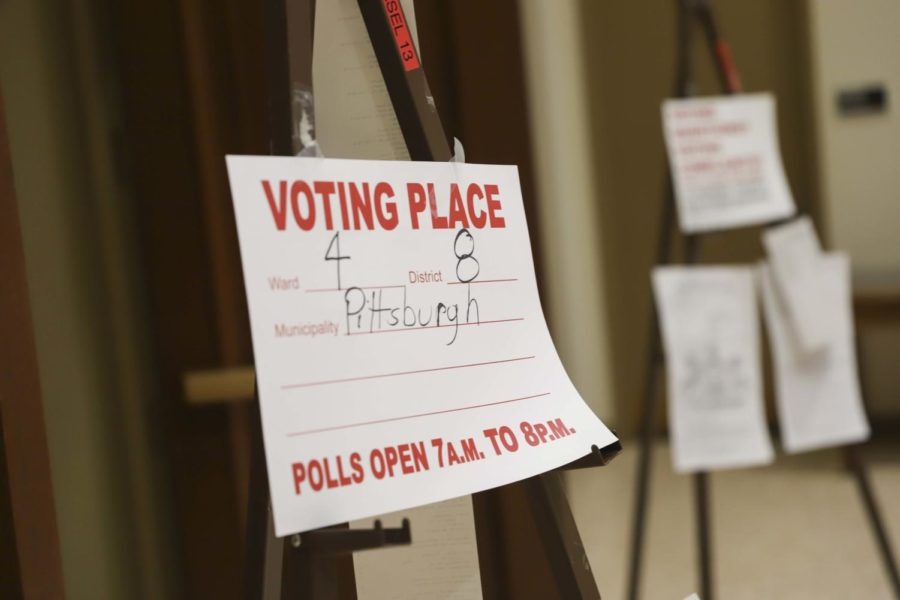Pittsburgh elections quiet as incumbents, favorites hold seats
Kaycee Orwig | Senior Staff Photographer
Incumbents won big in Tuesday’s elections.
November 6, 2019
For students like Emma Morganstein, Tuesday’s general election was an important opportunity to express their political voices.
“I think voting is the most important thing people can do, especially in local elections, because most decisions that affect me happen on the local level, not on the federal level,” Morganstein said. “I just wanted to come here and cast the ballots for the candidates I cared about.”
Morganstein, a first-year early childhood education major, was one of 263 people to vote at the William Pitt Union in Tuesday’s elections, which featured contested races for local offices as well as two ballot initiatives. But overall, it was a quiet election night in the county, with no major upsets in any of the races Pitt students voted in.
In the Pittsburgh City Council race for the district that includes the University of Pittsburgh, incumbent Democrat Bruce Kraus, who is the current City Council president, successfully fended off a challenge from Jacob Nixon — an independent candidate and a former construction worker. Nixon ran on a platform that focused on growing small businesses and cleaning up the neighborhoods he’d represent, but was defeated by more than a 30-point margin.
In one of the most-watched races in Allegheny County, incumbent Democrat District Attorney Stephen Zappala defeated a progressive challenge from independent candidate Lisa Middleman, a career-long public defender.
“Don’t take this as a race,” Middleman said in her concession speech. “Take this as a stepping stone.”
More than half of Zappala’s votes in Tuesday’s election came from straight-ticket ballots, a practice where voters press a single button to vote for all candidates of a single party. The Pennsylvania General Assembly voted this week to eliminate this practice. Zappala appeared as the candidate on both the Democratic and Republican ballots, meaning he benefited from each straight-party vote from anyone registered in the two parties in Allegheny County.
Zappala, who has held the district attorney’s office for more than 20 years, faced Turahn Jenkins in the Democratic primaries earlier in May, but fended off the challenge and won by 18 points. He has recently faced criticism for his handling of the prosecution of former police officer Michael Rosfeld, who fatally shot Antwon Rose II in 2018.
This was enough reason for Mo Elfayoumi, a sophomore molecular biology major, to vote for Middleman.
“I didn’t like Zappala’s handling of the Antwon Rose case, so I decided to go for the independent,” Elfayoumi said. “[Her] endorsements seemed to be aligned with my political views.”
Morganstein voted for Middleman as well, citing Zappala’s track record on criminal justice reform and her desire for change.
“I feel that the current district attorney is severely lacking and hasn’t done his job,” Morganstein said. “That’s what led me to support the independent candidate.”
Morganstein noted that this year’s election was even more important to her than presidential-year elections, since the candidates voted into office today have much more of an impact on her life than federal office-holders.
Of the two ballot initiatives, only one had its votes tallied. The other, a statewide ballot initiative to create an amendment enshrining Marsy’s Law in the State Constitution, cannot have its votes officially tallied after a Commonwealth Court judge ruled the votes can’t be certified.
Marsy’s Law would expand the legal rights of crime victims, including the rights to legal standing and protection from the accused. The ACLU has criticized the law, saying it “undermines due process and upends presumption of innocence.”
The other initiative, which would levy an additional $50 tax for each $100,000 of property value, passed by a narrow, 1,975-vote margin out of more than 60,000 ballots cast. The initiative represents a property tax increase of almost 6%, and the funds will be diverted to Pittsburgh Parks Conservancy, a private non-profit that provides funding for the maintenance of Pittsburgh parks.
The initiative was denounced by four sitting members of the City Council, with councilperson Deb Gross calling the initiative “unacceptable,” saying the initiative circumvents City control over parks maintenance. Gross was joined by councilpeople Anthony Coghill, Darlene Harris and Theresa Kail-Smith.
Pittsburgh Parks Conservancy spokesperson John Pepper told the Post-Gazette that “every park” in Pittsburgh would be improved by 2020 with the additional funding.
Democrats won other races by comfortable margins, such as County Executive Rich Fitzgerald, County Controller Chelsa Wagner and County Treasurer John Weinstein. This is a result that Madison Leonard, a third-year pharmacy student, hoped for. She said the most important thing to her was keeping Republicans out of office, which is why she voted for Democrats when she could.
“I’m transgender, so I like to vote against the Republican party when I can,” Leonard said.
But regardless of outcome, Elfayoumi said voting is an important right to exercise.
“I think it’s important to vote in every election that you can, to have a say in all forms of government,” Elfayoumi said.








